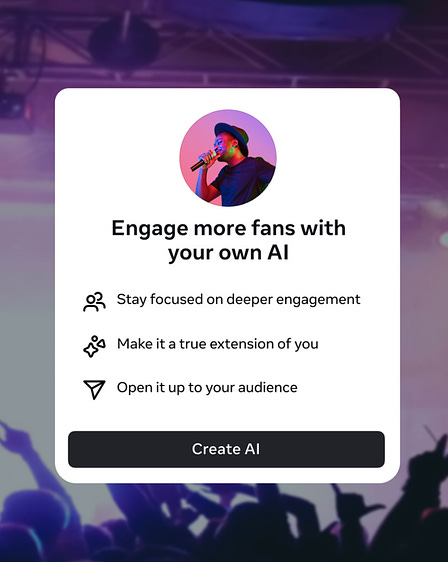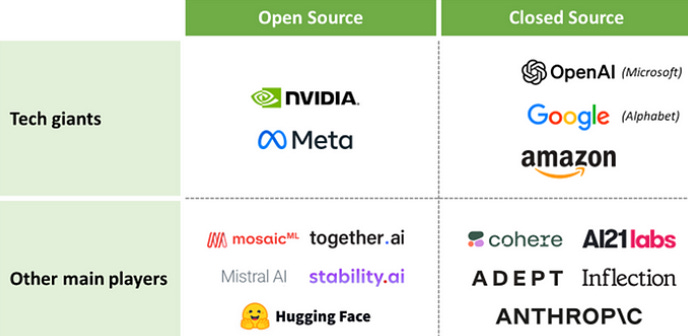🔓Will Open-Sourced AI Models be More Profitable Than Their Counterparts?Plus: Now You Can Create and Chat with Personalized AI Characters on Meta Apps.Get in Front of 50k Tech Leaders: Grow With Us Happy Hump Day, Community! Today we ponder: Will Open-Sourced AI Models prove more profitable than their proprietary counterparts? History suggests they just might, and we're excited to share our insights. Plus, discover how to create and interact with personalized AI characters on your Meta Apps. And in the ongoing battle of AI scrapers versus web defenses, it seems we're witnessing a real-life Tom and Jerry scenario. Let's dive into all this and more!
📰 AI News and Trends
🌐 Other Tech news
Now You Can Create and Chat with Personalized AI Characters on Meta Apps.Meta has launched AI Studio, a platform enabling easy creation of personalized AI characters, accessible via their site and the Instagram app. Users can craft AIs with unique names and traits for various uses, from cooking advice to meme generation, and they are shareable across major social networks. Powered by Llama 3.1, AI Studio supports creators in the U.S. by automating interactions like DMs and story replies, enhancing outreach while ensuring transparency. The initiative promotes accessible AI creation while prioritizing safe and enjoyable user interactions. Adapting Web Defenses Against Rapidly Changing AI Scrapers.As AI technologies evolve rapidly, websites are struggling to keep up with the latest AI scrapers. A common issue is the reliance on outdated blocking instructions in robots.txt files, which inadvertently allow newer, unlisted bots to access site content. This was highlighted by the case of Anthropic, where many sites blocked obsolete bots like "Anthropic-AI" and "Claude-Web" but failed to block the newer "Claudebot." To address this, Anthropic has updated Claudebot to respect block requests for its predecessors. However, the constant introduction of new bots by AI companies complicates the maintenance of effective blocking measures. Services like Dark Visitors are emerging to assist website owners in regularly updating their robots.txt files, ensuring they can effectively manage permissions against an ever-changing backdrop of AI scrapers. This ongoing challenge underscores the need for website owners to remain vigilant and proactive in updating their blocking strategies, as AI companies continue to push the boundaries of web scraping practices. 🧰 AI ToolsHuman Resources III.
Will Open-Sourced AI Models be More Profitable Than Their Counterparts?Open-sourced AI models have become increasingly popular, with Meta's Llama 3.1 leading the conversation. These models are often made freely available to most companies, facilitating broad integration of advanced AI technologies. This approach, termed "commoditizing your complement," aims to increase demand for the company’s products by making related technologies more accessible—an effective strategy previously utilized by Google Search. Google provided its search services for free, offsetting the substantial costs of servers and infrastructure through significant ad revenue—a model echoed by many social media platforms, underscoring the adage "If it's free, then you are the product." This strategy significantly reduces the cost of advanced AI for end-users, potentially broadening adoption and benefiting companies that sell the necessary hardware, like servers and cloud services, required to run these resource-intensive models. While this democratizes access to cutting-edge AI and fosters innovation among smaller entities, it also presents substantial challenges for AI startups competing against large firms that offer essential technologies at no cost. Companies that release open AI models gain considerably from the wealth of data generated. This data not only continuously improves model accuracy and expands applications, driving innovation, but also offers insights into user interactions that can enhance user experiences and inform product development. Furthermore, this data helps refine training datasets, reducing biases and improving performance. By understanding user behaviors and preferences, companies can uncover new monetization avenues, such as targeted advertising, which has turned companies like Google and Meta into today’s tech giants. Leveraging these insights enables large tech companies to boost ad sales by delivering more personalized and effective advertising, thus maximizing their revenue streams while maintaining a competitive market edge. 🚀 Showcase Your Innovation in the Premier Tech and AI Newsletter (link) As a vanguard in the realm of technology and artificial intelligence, we pride ourselves in delivering cutting-edge insights, AI tools, and in-depth coverage of emerging technologies to over 55,000+ tech CEOs, managers, programmers, entrepreneurs, and enthusiasts. Our readers represent the brightest minds from industry giants such as Tesla, OpenAI, Samsung, IBM, NVIDIA, and countless others. Explore sponsorship possibilities and elevate your brand's presence in the world of tech and AI. Learn more about partnering with us. You’re a free subscriber to Yaro’s Newsletter. For the full experience, become a paying subscriber. Disclaimer: We do not give financial advice. Everything we share is the result of our research and our opinions. Please do your own research and make conscious decisions. |
Wednesday, July 31, 2024
🔓Will Open-Sourced AI Models be More Profitable Than Their Counterparts?
Subscribe to:
Post Comments (Atom)



No comments:
Post a Comment